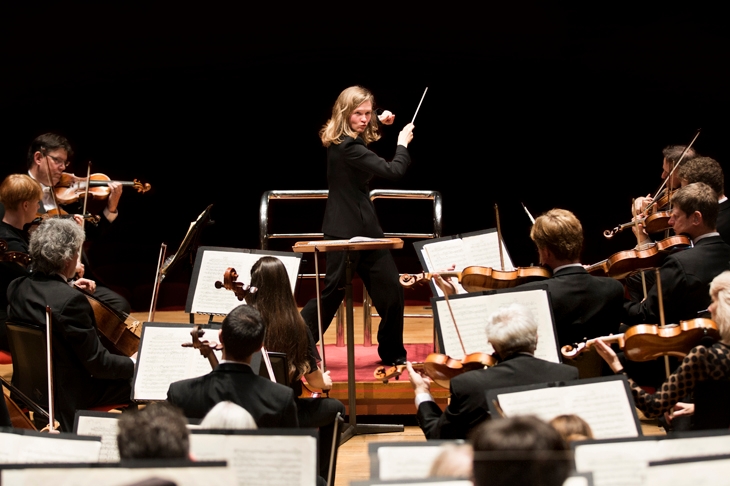Brahms didn’t always have a beard. The picture in the London Symphony Orchestra’s programme book showed him clean-shaven, and rightly. The beard didn’t reach its final imposing form until 1878, around the time Brahms started sketching his Second Piano Concerto. (‘Prepare your wife for the grisly spectacle,’ he wrote to his friend Bernhard Scholz, ‘for something so long suppressed cannot be beautiful.’) But this concert opened with the First Piano Concerto, premièred in January 1859 when the composer was still a few months short of his 26th birthday. Younger, in fact, than tonight’s conductor — the 26-year-old Alpesh Chauhan — and not much older than the soloist, Benjamin Grosvenor.
Age shouldn’t really matter in music, but it does. Classical musicians are generally assumed to ripen with age: it’s why Sir Simon Rattle (62) is only now reckoned to be entering his prime. There’s something in that, though for every moment of rich, mature insight you’re as likely to hear a celebrity septuagenarian coasting on autopilot through an interpretation that’s been set solid for decades. Nonetheless, gerontophilia is endemic among classical music buffs of the record-collector type. At worst, it can breed a cynicism about young talent; the notion that an artist needs to have given the Reith Lectures before he or she can have anything worthwhile to say about Schubert, a composer who died at the age of 31.
Chauhan and Grosvenor’s Brahms wasn’t definitive (whatever that means), and I doubt that either of them wanted it to be. I’ve known Chauhan since he was a teenage cellist in Birmingham, and part of me was hoping for an earthquake — perhaps, if I’m honest, something to measure against Clifford Curzon and George Szell’s 1962 recording (see, we’re none of us immune to it). It wasn’t like that at all. The finale was brisk and springy, and the pair lingered dreamily over Brahms’s central Adagio. But it’s the massive first movement that defines any performance of this concerto, and Grosvenor and Chauhan approached it with enormous breadth and intense inwardness — as if these two young artists had agreed to retreat into a private world and make chamber music together. Chauhan opened up pools of stillness while Grosvenor lovingly clarified Brahms’s counterpoint, teasing out individual voices and making them glow.
The concert ended with Brahms’s Haydn Variations and Richard Strauss’s Death and Transfiguration, offering some useful indicators of Chauhan’s possible future direction. First, he has the ability, more often heard on recordings from the 1950s (there we go again), to make a musical phrase feel like articulate speech. Chauhan knows how to give his musicians the space in which to be themselves, and the LSO woodwinds repaid that freedom tenfold. Secondly, he made Strauss’s luscious surges of string tone sing from within. And thirdly, he perceives a symphonic work as a single arc, and can make moments of repose — even silence — feel like they’re moving forward. These qualities will surely deepen with time. Meanwhile, we heard interpretations that suggested new possibilities rather than offering a final word; sincere, refreshing and — on their own terms — moving.
After the acoustic fug of the Barbican (pity the LSO, sending its glorious sound out to die each night in a desert of 1980s upholstery), returning to Symphony Hall felt like diving into pure clear water. Six months into her new job with the City of Birmingham Symphony Orchestra, Mirga Grazinyte-Tyla’s concerts are already major occasions, and the hall’s 2,200 seats looked pretty much full. Grazinyte-Tyla seemed energised by all that goodwill, slotting in Purcell’s Funeral March for Queen Mary, unannounced, before launching straight into Beethoven’s Fifth Symphony. No explanation was offered, or really needed. It made her swift, lean account of the symphony feel as if it were emerging from some unseen musical continuum — and that she and her players were channelling Beethoven straight from the source.
It certainly helps that Grazinyte-Tyla has such an instinct for classical style. She makes the stereotyped flourishes and cadences of 18th-century music really dance. In Mozart’s 27th Piano Concerto, the pianist Francesco Piemontesi sat with the keyboard facing the audience. Grazinyte-Tyla stood at the other end of the piano, literally in the middle of the orchestra, turning from violins to woodwinds to soloist with a minimum of superfluous hand-waving. Earlier, in the finale of Haydn’s Hornsignal symphony, she appeared to be deriving huge pleasure simply from accompanying Haydn’s increasingly droll instrumental solos (even the double bass gets a look-in). Grazinyte-Tyla is 30 years old and her rise is sometimes attributed to hype, an attitude that belittles not only her self-evident musicality but the collective judgment of the 80-odd orchestral musicians — veterans of Rattle and Andris Nelsons — who’ve chosen her as their artistic leader. To see her in the company of her colleagues, smiling and making music, does the soul good.






Comments